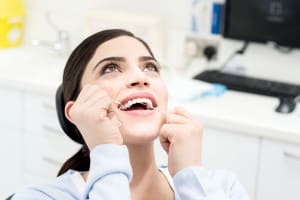 The American Dental Association (ADA) recommends brushing your teeth at least twice a day and flossing at least once, preferably before bedtime. Chances are, you knew that already. You might also know that the ADA advises attending a routine dental checkup and cleaning at least once every six months, or more often, if directed.
The American Dental Association (ADA) recommends brushing your teeth at least twice a day and flossing at least once, preferably before bedtime. Chances are, you knew that already. You might also know that the ADA advises attending a routine dental checkup and cleaning at least once every six months, or more often, if directed.
Nevertheless, neglecting professional dental care is common, and remains a significant risk factor in the development of most dental diseases. But why does the integrity of your smile depend on professional dental cleanings when you already clean your teeth twice every day?
The Limitations of Your Toothbrush and Floss
Cleaning food particles from around and between your teeth is only a part of your dental hygiene’s importance. An equally important target is the sticky substance that adheres to your teeth and feeds on these food particles—dental plaque. This colorless, uncomfortable mass is the product of oral bacteria, which produce plaque as protection from saliva and other natural defenses.
When you miss a spot or two of plaque, they can calcify (harden) into an insoluble substance called tartar, which is too stubborn for your toothbrush and floss to remove. Given enough time, the germs protected by plaque and tartar undergo metabolic processes that can erode your tooth enamel, inflame your gums, foul your breath, and compromise the health of your entire smile.
What Happens at Regular Dental Cleanings?
Using professional tools and a skilled eye, your dental hygienist will thoroughly remove all traces of plaque, tartar, and bacteria from your teeth and gums, reducing the chance of developing a dental disease. To ensure your continued good oral health, your checkup and cleaning appointment also includes a thorough examination to search for early signs of trouble. Early detection and treatment of dental diseases, which are typically progressive, can help you avoid the need for extensive dental treatment to restore your smile later.



